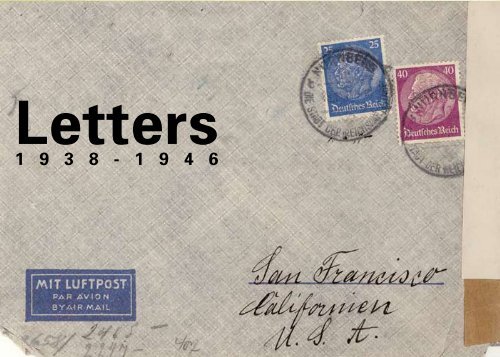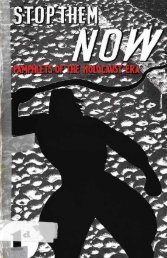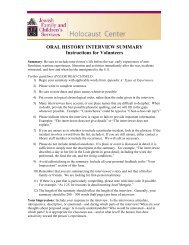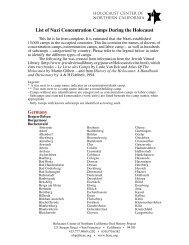Download exhibit catalogue - Tauber Holocaust Library
Download exhibit catalogue - Tauber Holocaust Library
Download exhibit catalogue - Tauber Holocaust Library
Create successful ePaper yourself
Turn your PDF publications into a flip-book with our unique Google optimized e-Paper software.
Letters<br />
1 9 3 8 - 1 9 4 6
Letters<br />
1 9 3 8 - 1 9 4 6<br />
“We live in the hope that we will be able to embrace you once again.”<br />
During the years of the <strong>Holocaust</strong>, as avenues of escape from<br />
Nazi persecution in Germany and occupied Europe disappeared,<br />
many European families found themselves separated -- on one<br />
side were family members safely living in the United States or<br />
England – on the other side, family and friends subject to ever<br />
increasing dangers were living under Nazi rule and the threat of<br />
extermination.<br />
“So, that’s how things are here, it’s impossible to remain here.”<br />
Communication was difficult. Letters were delayed; letters<br />
were opened by censors on both sides; and later, letters were<br />
returned to the sender. Delays meant that letters crossed each<br />
other, and family members on both sides waited anxiously for<br />
word -- word about the safety and well being of their loved<br />
ones; word about the prospects for visas, boat tickets, and the<br />
means to escape Nazi-ruled Europe.<br />
“Please use all of your resources, we are begging you.”<br />
rescue grew remote, the letter writers continued to reach out<br />
to those they loved through their letters and postcards. Those<br />
in Europe, while anxious about their future, often sought to allay<br />
their loved ones’ fears. Those helplessly waiting in safety for<br />
news wrote and tried to reassure those in danger.<br />
“In the meantime, I beg you again and again, do not lose<br />
courage, and support one another as well as you possibly can.<br />
Remember, things can’t go on like this forever.”<br />
The letters in these display cases are those written by family<br />
and friends in Nazi-occupied Europe. The letters sent to them<br />
are lost. Selected from collections of the HCNC Archives, they<br />
provide an intimate view into the events of those years. Each<br />
letter is just one small part of a true story of real men, women<br />
and children trapped by dangerous events in a terrible time.<br />
The love, anguish, persistence, courage and heartbreak they<br />
express are a testament to each individual, the lives they led<br />
and those they lost.<br />
“When will we see each other again?”<br />
These letters were the only means of contact between parents<br />
and children, husbands and wives, friends and relatives who<br />
had been cruelly divided. As time passed and the hope of
“Make it possible for us to come to<br />
you! We are begging you.”<br />
“Each day is priceless.”<br />
“Our situation is such that you have<br />
to send us right away, without any<br />
delay, the papers and boat passes.<br />
Otherwise we are simply destined for the<br />
worst fate that is possible.”<br />
The letters of the Becker family<br />
The Becker family of Poland was divided<br />
both by distance and by increasingly limited opportunities to<br />
emigrate. Martin Becker and his mother Zelda were living in<br />
the United States by 1938; father Abraham and brothers Tadek<br />
and Lolek lived in Warsaw.<br />
Postcard after postcard to Martin and Zelda pled for assistance<br />
in obtaining exit visas and boat passes. But they were helpless<br />
to rescue the father and brothers who remained in Poland.<br />
Despite the terrible obstacles to escape and the deteriorating<br />
conditions in Warsaw, in one postcard Tadek reassured his<br />
mother that they were managing well and asked her not to<br />
worry. Abraham, Tadek and Lolek Becker perished in Treblinka.<br />
Warsaw<br />
January 18, 1940<br />
My dear!<br />
Just imagine -- we are presently living in Warsaw. Write and send<br />
your letters via the Red Cross to Edzia’s address..<br />
Our situation is such that you have to send us right away, without any<br />
delay, the papers and boat passes. Otherwise we are simply destined<br />
for the worst fate that is possible. It is very easy to get papers and<br />
boat passes (this is what they told me in the U.S. Consulate) and<br />
many people left Poland that way, for example Mr. Orzechowski from<br />
Warsaw. Remember that this is our last resort and the only chance to<br />
survive. Contact our uncles right away, to tell them that they should<br />
do all that is possible to save our lives. They should not procrastinate<br />
about anything. Each day is priceless. Send the papers and boat<br />
passes for us to the American Consul in Warsaw, 29 Aleje Ujazdowskie.<br />
We are begging our uncle, simply falling on our knees, with tears in<br />
our eyes. The cost of all of this is very low. Where is Mom right now?<br />
Write to us about all of that via the Red Cross (this is the simplest<br />
way). Write a letter to our uncles right away about our case. We will<br />
not pull through much longer than spring. Regards from all of us to all<br />
of you, Tadek.<br />
Translation by Ewa Basinska and Jeffrey Mifflin.
Deportation from Wiesbaden.<br />
Copyright Foto-Rudolph.<br />
“Now, my dear children, I have to say goodbye, hope and<br />
wish all luck is with you. Thanks very much for everything,<br />
whatever you did for us. Goodbye and God bless you, your<br />
dear mother”
“Whether you ever get this letter is a question.”<br />
“Everything is so terrible and I am wondering when they<br />
take us away.”<br />
The letters of Hans Esberg<br />
Dr. Hans Esberg lived in San Francisco during the war years.<br />
His mother remained in Wolfenbüttel, Germany. She wrote a<br />
final letter to him in March 1943, shortly before her deportation<br />
to Theresienstadt, and entrusted it to a friend to deliver.<br />
When the United States Army was fighting in Germany, this<br />
friend passed the letter on to an American soldier, himself an<br />
immigrant from Germany. The soldier, Berthold Berlizheimer,<br />
translated it into English and sent it to his wife in Los Angeles.<br />
Mrs. Berlizheimer in turn sent the letter to Dr. Esberg in<br />
San Francisco. But Dr. Esberg’s mother had already died in<br />
Theresienstadt by the time the letter was received, over two<br />
years after it had been written.
“We live in the hope that we will be able to embrace you<br />
once again.”<br />
“I beg you again and again, do not lose courage”<br />
The letters of Mae Berschtel Mendelsohn Mandl<br />
The Berschtel family were among the over 17,000 Polishborn<br />
Jews who were forced from their homes and<br />
businesses in Germany in late October 1938 and relocated<br />
in Poland. Marie (Mae) Berschtel left shortly after for the<br />
United States where she married Felix (Peel) Mendelsohn.<br />
Mae’s brother and his wife escaped to Palestine. Mae’s<br />
parents and two sisters – Hilde and Anni – remained behind<br />
in Poland.<br />
The letters to Mae from her parents and sisters were full of<br />
love and concern for her, and downplayed their hardships.<br />
The last postcard Mae received, dated October 12 1941,<br />
however, provides a glimpse into the privations the family<br />
was enduring. Mae Mandl’s parents and sisters perished<br />
during the <strong>Holocaust</strong>.<br />
------------------------------------------------------------------------------------------------<br />
Mae Mandl’s parents wrote to her regularly – her father<br />
wrote in German and her mother wrote in Yiddish. But even<br />
their intimate correspondence was limited by the Nazis. In<br />
a letter dated May 22, 1941, Hilda’s father tells Mae that<br />
writing in Yiddish is no longer permitted: “Mother didn’t get<br />
to write.. one is only allowed to write in German. “
Anni Berschtel
“Besides this I beg you very much to let me have any<br />
available information as to what else or what more could be<br />
done to free my poor old parents from Theresienstadt.”<br />
The letters of A. Leo Oppenheim<br />
A. Leo Oppenheim and his wife Lilly left Vienna in 1938, and<br />
arrived in the United States in 1941. Dr. Oppenheim’s sister<br />
and her husband also managed to escape Austria. Their elderly<br />
parents – Alfred and Johanna Oppenheim – remained behind.<br />
Upon his arrival in the United States, Dr. Oppenheim worked to<br />
secure his parents safety. He obtained visas to Cuba for them,<br />
but the entrance of the United States into the war in December<br />
1941 made it impossible for the Oppenheim parents to leave<br />
Germany. They were sent to Theresienstadt.<br />
Dr. Oppenheim’s efforts to secure his parents’ release<br />
continued long after their deaths. In 1945, he attempted to have<br />
them included in a prisoner exchange for Palestine, not knowing<br />
that they had perished in Theresienstadt the year before.<br />
Nazi troops<br />
parade in<br />
Vienna.
“May our dear God protect our loved ones and give them<br />
the strength to endure all the horrors.”<br />
The letters of Hilda Prager Silberberg<br />
Hilda (Hilde) Prager emigrated to the United States from<br />
Germany in late 1938, leaving her mother Paula Prager behind<br />
in Nuremberg, Germany. Hilda and her mother enjoyed a close<br />
and loving relationship and corresponded frequently. From<br />
1938-1941, Paula Prager wrote to her daughter<br />
Hilda weekly.<br />
Hilda’s last letter to her mother, dated<br />
November 30, 1941, was returned to her in<br />
July 1942 with the note: “Return to Sender.<br />
Services Suspended.” Despite the best efforts<br />
of Hilda and her husband Otto Silberberg to<br />
bring Mrs. Prager to the United States, she<br />
was deported from Nuremberg in early 1942.<br />
Hilda’s cousin wrote her on April 29, 1942:<br />
“What we have suspected for a long time<br />
has now become a fact. [They] have gone<br />
on a long journey and it will be a long time<br />
until we hear anything from them.” Pauline<br />
Prager was deported to Izbica, Poland, and<br />
perished in an extermination camp.<br />
Hilda kept all her correspondence from<br />
family and friends until her death. There<br />
were over 135 letters from her mother<br />
alone.<br />
1850 Fulton St.<br />
San Francisco California<br />
November 30 1941<br />
To: Paula Prager<br />
58/ II<br />
Obere Pirkheimer Strasse<br />
Nuremberg, Germany<br />
My Very Dearest Mama:<br />
We received your dear letter and are so happy to learn that you are all in<br />
good health and getting by. We are the same, thanks be to God. We never<br />
did get the letter, in which you write that we shouldn’t do anything else<br />
about the Cuba matter (you wrote about that on November 11), and we<br />
never got your telegram of November 11. The only one we got was from the<br />
Hamburg-America Line (Hapag) on November 20, and we wrote you about<br />
that last week.<br />
Dear Mama, it is in no way a sacrifice by us, to do everything for you, and<br />
on our side everything has happened so that you might come. We are able<br />
to fulfill all the conditions set by Cuba, and would do so only too gladly.<br />
As you know, and know better than we do, there is no exit permit, as Hugo<br />
telegraphed me on Friday. It was a real blow to us and we only hope, that<br />
this is only a temporary measure, and that with God’s help we shall see<br />
each other soon. In any case, dear little mother, everything is prepared,<br />
and at the moment, when you telegraph that you can come, we will take<br />
further steps. You can well imagine how awful it is for us to be so near the<br />
goal and for everything to be postponed all over again. For the third time<br />
now. ... We want to remain brave and not lose our courage. Papa always<br />
used to say, the old God still lives and will help us. ...Greet all the dear<br />
ones from me. Be kissed and greeted yourself in the most loving way.<br />
Hold your head high! In all faithfulness! Your Hilde<br />
Hilda Prager Silberberg
My Dear Mother!<br />
I am terribly sorry that everything has been deferred, although not<br />
cancelled; there’s no way to fight against current conditions. Keep on<br />
living well and be most lovingly greeted and kissed<br />
Otto<br />
Translation by John Bass
“Please do absolutely all in your power to save us.”<br />
“It is vital that not a single moment be lost as it is a<br />
question of life and death…. It depends on you alone.”<br />
Letters sent to Harry Goodman<br />
Harry Goodman was the secretary of Agudath Israel, a political<br />
arm of Orthodox Jewry, located in London. He spent the war<br />
years desperately trying to rescue Jews trapped in Europe.<br />
These letters, smuggled out of Camp Vittel in France, were<br />
written on cigarette paper and the lining of a jacket. They<br />
provide names of over 250 Polish Jews about to be deported<br />
from the camp to the East, and beg for assistance in saving<br />
their lives.<br />
Harry Goodman papers on loan courtesy of Nachman Goodman.
Laszlo N. <strong>Tauber</strong>, z’l<br />
A gifted athlete, brilliant surgeon and creative businessman, Laszlo N. <strong>Tauber</strong>, z’l, was born in Budapest in<br />
1915. Upon graduating from medical school he was designated the acting chief of surgery at the Jewish<br />
Hospital, later renamed the International Red Cross Hospital. In 1944 as the Nazis began their persecution,<br />
deportation, and murder of Hungarian Jews, <strong>Tauber</strong> performed surgeries on the wounded and rescued<br />
countless Jews by forging identity papers. <strong>Tauber</strong> escaped to the United States in 1947, giving his first<br />
charitable donation of $250, from his $1600 annual income, to Walter Reed Army Hospital. “I am a<br />
Hungarian Jew who survived the <strong>Holocaust</strong>,” <strong>Tauber</strong> wrote. “As a token of appreciation, my first savings I<br />
would like you to give to a soldier of your choice.”<br />
Settling in Washington, D.C., <strong>Tauber</strong> built a thriving surgical practice, started his own hospital, and created<br />
real estate holdings that enabled him to pursue many philanthropic endeavors. Among the numerous<br />
important causes <strong>Tauber</strong> supported was the preservation of the memory of the <strong>Holocaust</strong>. In 1995 <strong>Tauber</strong><br />
was given the Medial of Merit, the highest award bestowed by the Red Cross, for his courage in rescuing<br />
Jews during the <strong>Holocaust</strong>. Following his death at age 87 in 2002, his children Dr. Ingrid <strong>Tauber</strong> and Dr.<br />
Alfred <strong>Tauber</strong> established The Laszlo N. <strong>Tauber</strong> Family Foundation to continue his philanthropic work. It is<br />
through the Foundation’s generosity that this <strong>exhibit</strong>ion is made possible.<br />
Letters: 1938-1946 is made possible by a grant from the Laszlo N. <strong>Tauber</strong> Family Foundation.<br />
121 Steuart Street, Suite 10<br />
San Francisco, CA 94105<br />
415-777-9060<br />
www.hcnc.org<br />
Monday-Thursday<br />
10am - 5pm<br />
Exhibit curated by Judith Janec<br />
Exhibit design by Daniel Buckwald





